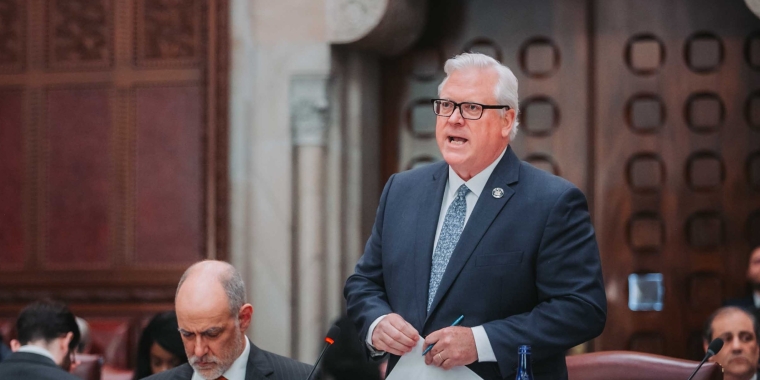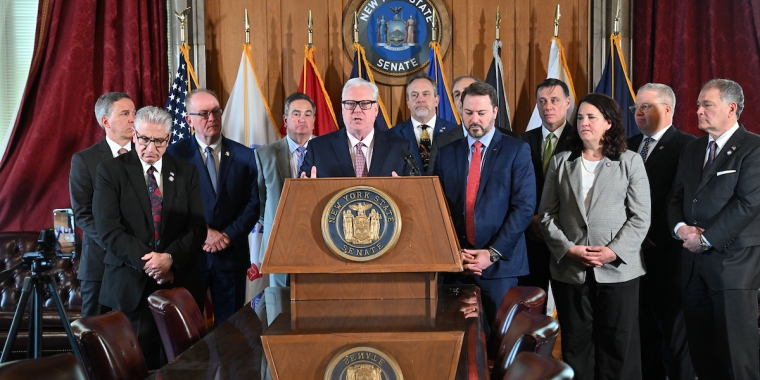
Forum/Town Hall: O'Mara hosts Albany Roundtable on 'major change' underway in rural transportation (Updated)
- Transportation
Albany, N.Y., May 6—State Senator Tom O’Mara (R,C-Big Flats), a member of the Senate Transportation Committee, today sponsored a “Finger Lakes and Northern New York Medicaid NEMT Roundtable Discussion” in Albany.
O’Mara’s roundtable was held from 11:30 a.m. to 1:00 p.m. in Room 124 of the Capitol.
“The Medicaid redesign effort in Non-Emergency Medical Transportation represents a significant shift in public transportation services in many areas, but especially in rural, upstate regions,” said O’Mara. “Some local leaders in my Senate district fear that it’s evolving as one of those classic traps that the Albany bureaucracy so often falls into by attempting a statewide, one-size-fits-all approach that ends up hurting rural, upstate New York. So we’re going to try to bring more widespread attention to the changes underway, fully assess the consequences for our localities and do what we can to ensure that the rural, upstate impact gets a fair hearing.”
According to O’Mara, the state’s ongoing and comprehensive Medicaid redesign strategy includes a shift, already underway in many places, in the administration and management of Medicaid Non-Emergency Medical Transportation (NEMT) from localities to the state. It’s viewed as a cost-cutting move by the state, but a number of local officials from O’Mara’s district have raised concerns about the plan and, especially, its impact on rural communities and populations, including the disabled and the elderly across the Southern Tier and Finger Lakes regions, and statewide.
The state Department of Health (DOH), which administers NEMT, has procured a state-level transportation management contract for 24 counties in the Hudson Valley and New York City. DOH has currently started the transition process in the Finger Lakes region and Northern New York.
Local officials, mobility managers, transportation providers and community organizations in these rural regions fear that a one-size-fits-all approach that might work in suburban and urban areas downstate won’t work in the rural, upstate communities they represent.
Consequently, O’Mara has invited a number of these officials and providers to Albany on May 6th to discuss the potential shortcomings of the new system, including the possible elimination of existing transportation routes, the future of locally based cost-efficiency initiatives and the overall disruption of services to persons with disabilities, seniors and other local residents who have long depended on this transportation system.
Regional officials scheduled to participate in today’s discussion include: Jim Arey of the Elmira-Chemung Transportation Council; Jeanette Frank, Executive Director, The ARC of Schuyler County; Amber Simmons, Mobility Manager, The ARC of Schuyler County; and Jim Gorman, Regional Director, First Transit Inc.
[May 6th UPDATE:
O'Mara says discussion raises questions about impact on rural, upstate transportation services
Albany, N.Y., May 6—After hearing testimony today from a number of upstate transportation officials, including several from across the Southern Tier and Finger Lakes regions, State Senator Tom O’Mara (R,C-Big Flats) said today that a state-mandated transition underway in rural transportation services is leaving too many questions and concerns unanswered for many upstate counties.
“Our concern was that the state is trying to implement a one-size-fits-all approach that might work in suburban and urban areas downstate but won’t work in many rural, upstate communities,” said O’Mara. “After today’s discussion, it’s an even greater concern. We’re hopeful that after we share this local, upstate input with the state Department of Health, it will encourage the greater coordination and collaboration with our rural counties that’s clearly needed.”
O’Mara, a member of the Senate Transportation Committee, sponsored a “Finger Lakes and Northern New York Medicaid NEMT Roundtable Discussion” in Albany earlier today at the Capitol. It brought together local officials, mobility managers, transportation providers and community organizations from rural, upstate regions to discuss the potential shortcomings of the new system, including the possible elimination of existing transportation routes, the future of locally based cost-efficiency initiatives and the overall disruption of services to persons with disabilities, the elderly and other local residents who have long depended on this transportation system.
The state Department of Health (DOH), which administers NEMT, has procured a state-level transportation management contract for 24 counties in the Hudson Valley and New York City. DOH has currently started the transition process in the Finger Lakes region and Northern New York.
“It was a productive discussion and hopefully it will offer some important suggestions to the state health department as it moves forward with this significant transition in rural transportation,” said O’Mara. “The state’s overriding goal is to cut costs, but the transition underway could end up costing our localities more, in many ways, if it’s not undertaken with greater awareness, cooperation and sensitivity in rural New York.”
According to O’Mara, today’s meeting reinforced the concerns he has about the plan and, especially, its impact on rural communities and populations, including the disabled and the elderly across the Southern Tier and Finger Lakes regions, and statewide.
Regional officials participating in today’s discussion included: Jim Arey of the Elmira-Chemung Transportation Council; Jeanette Frank, Executive Director, The ARC of Schuyler County; Amber Simmons, Mobility Manager, The ARC of Schuyler County; and Jim Gorman, Regional Director, First Transit Inc.
How a Bill Becomes Law
Learn More-
Senator has new policy idea
-
Idea is drafted into a Bill
-
Bill undergoes committee process
-
Senate and Assembly pass bill
-
Bill is signed by Governor




